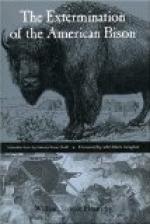Said he, “It would have been well both for the Indians and the white men if an enactment of this kind had been placed on our statute-books years ago. * * * I know of no one act that would gratify the red men more.”
Mr. Holman expressed surprise that Mr. Cox should make any objection to parts of the measure. The former regarded the bill as “an effort in a most commendable direction,” and trusted that it would pass.
Mr. Cox said he would not have objected to the bill but from the fact that it was partial in its provisions. He wanted a bill that would impose a penalty on every man, red, white, or black, who may wantonly kill these buffaloes.
Mr. Potter desired to know whether more buffaloes were slaughtered by the Indians than by white men.
Mr. Fort thought the white men were doing the greatest amount of killing.
Mr. Eldridge thought there would be just as much propriety in killing the fish in our rivers as in destroying the buffalo in order to compel the Indians to become civilized.
Mr. Conger said: “As a matter of fact, every man knows the range of the buffalo has grown more and more confined year after year; that they have been driven westward before advancing civilization.” But he opposed the bill!
Mr. Hawley, of Connecticut, said: “I am glad to see this bill. I am in favor of this law, and hope it will pass.”
Mr. Lowe favored the bill, and thought that the buffalo ought to be protected for proper utility.
Mr. Cobb thought they ought to be protected for the settlers, who depended partly on them for food.
Mr. Parker, of Missouri, intimated that the policy of the Secretary of the Interior was a sound one, and that the buffaloes ought to be exterminated, to prevent difficulties in civilizing the Indians.
Said Mr. Conger, “I do not think the measure will tend at all to protect the buffalo.”
Mr. McCormick replied: “This bill will not prevent the killing of buffaloes for any useful purpose, but only their wanton destruction.”
Mr. Kasson said: “I wish to say one word in support of this bill, because I have had some experience as to the manner in which these buffaloes are treated by hunters. The buffalo is a creature of vast utility, * * *. This animal ought to be protected; * * *.”
The question being taken on the passage of the bill, there were—ayes 132, noes not counted.
So the bill was passed.
On June 23, 1874, this bill (H. R. 921) came up in the Senate.[74]
[Note 74: Congressional Globe, Vol. 2, part 6, Forty-third Congress, first session.]
Mr. Harvey moved, as an amendment, to strike out the words “who is not an Indian.”
Said Mr. Hitchcock, “That will defeat the bill.”
Mr. Frelinghuysen said: “That would prevent the Indians from killing the buffalo on their own ground. I object to the bill.”




